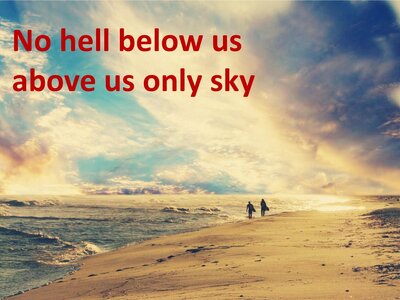I've seen this commercial few times. What are your thoughts? I do believe in heaven and when it's your time you'll see the people who passed before you
The Original Gay Porn Community - Free Gay Movies and Photos, Gay Porn Site Reviews and Adult Gay Forums
-
Welcome To Just Us Boys - The World's Largest Gay Message Board Community
In order to comply with recent US Supreme Court rulings regarding adult content, we will be making changes in the future to require that you log into your account to view adult content on the site.
If you do not have an account, please register.
REGISTER HERE - 100% FREE / We Will Never Sell Your InfoTo register, turn off your VPN; you can re-enable the VPN after registration. You must maintain an active email address on your account: disposable email addresses cannot be used to register.
You are using an out of date browser. It may not display this or other websites correctly.
You should upgrade or use an alternative browser.
You should upgrade or use an alternative browser.
Are you going to heaven or not?
- Thread starter MusicMan321
- Start date
- Joined
- Dec 4, 2006
- Posts
- 118,392
- Reaction score
- 28,207
- Points
- 113
For all those who believe in Heaven, I hope you achieve the goal.
My sister and I told my dying mother, when she siad she'd see us again there someday, that it wasn't likely because:
1. We preferred the warm climate of Hell
2. A lot of the company would likely be more fun.
My sister and I told my dying mother, when she siad she'd see us again there someday, that it wasn't likely because:
1. We preferred the warm climate of Hell
2. A lot of the company would likely be more fun.
Of course I'm going.
Peloso
no, really, I'm fine
- Joined
- Dec 15, 2018
- Posts
- 7,059
- Reaction score
- 3,525
- Points
- 113
I went to the site to find out. Apparently it works exactly like the Evil Dead movies where all you have to do is recite an incantation and you get possessed by a demon, but this time, it's Jesus.
He's in me now. The poor guy must be very uncomfortable.
He's in me now. The poor guy must be very uncomfortable.
My thoughts? It's all mumbo jumbo.
NotHardUp1
What? Me? Really?
There is quite a range of belief within modern Christianity on the topic/dogma of heaven.
Progressive theologians hold that it is a Utopic goal that will be realized when we purge ourselves and the world of its evil: greed, envy, cruelty, selfishness, etc., a sort of collectivve nirvana. That is obviously heavily influenced by Hinduism and inroads made into Western thought by the adoption of Eastern Mysticism by philosophers in the Industrial Era and after.
Traditional believers take it quite literally as an afterlife and society where the human spirit endures without the pathos and suffering of the corporeal world and the competition and conflict it brings. Many concepts within Judaism and Christianity evolved to imagine it as an imperial court, likely because that was the most cherished life imaginable for most cultures, with a caste system and everyone quite privileged and living among riches.
There are also glints of a more abstract paradise, with references to lions lying down with lambs, etc., but even that is referred to as a kingdom.
In between the two are those who hold that the afterlife is real, but that the Atonement within Christian dogma is an injection and overinterpretation of the Judaic custom of damning their enemies to the hatred of God, hence a dichotomy grows of the absolute torture of Hell versus the bliss of Heaven. This trend in thinking evolved into the doctrine of Universal Atonement, holding that the Atonement was real, but was absolute and complete, meaning no profession of faith or "magic words" like the Fundamentalists propagate, are necessary, as the diviine intervention on the cross forever closed the gap of separation between fallen man and the perfection of the Divine.
My own faith is toward the progressive side, but with a goodly measure of Calvinism thrown in. We were never of the "name it, claim it" strain of Evangelicals. Grace is more akin to Divine fiat, so presuming to merit it goes against the very nature of the Creation as created beings. For reference, the discourse between Job and his Maker at the end of the story convey the mood, a sort of imperial disdain for arrogant presumption of man, and particularly for those who seek to justify themselves. This wisdom writing is not unlike the tone of the Eastern religions that teach of the emptying of self in order to gain enlightenment, plus the concept that it is really beyond us after we've done whatever we can to live as better humans in this world.
A very concise depiction of this humility on the scales is the apocryphal poem by Leigh Hunt of Abu Ben Adhem:

 www.poetryfoundation.org
www.poetryfoundation.org
The intent is clear evidence of the growing rejection of the damnation dogma by thinkers in the West, a movement we now term Syncretism. Bumper stickers display it with the multiple icons of diverse major religions.
So, I fall in that general part of the Venn diagram, believing in the afterlife, but not believing it is some royal court of luxury and privilege, more a transcendent existence freed from the vice that corrupts this plane of existence. And I believe we are created beings, and that evolution is a part of that creative process, and that, just as we did not understand evolution for the majority of our collective existence, we do not now understand our next stage, nor even what we will learn as a species in the here and now.
Just as anti-religionists attack the concept of Heaven as a cruel, manipulative, and empty myth, many within the subject religions also reject it as a misconstrued tenet in the past ages, as sugar teat to quiet the crying child, so to speak. Rather, we believe it is the symbol of hope, a terminus that pulls us up to be better people among people, to be better stewards of what we have, and the planet. We do not aspire out of fear, or out of presumption, or of greed, to see a better existence, both here and hereafter. There is a hint that if we do not prepare here by adopting our thinking and values, that we will not be able to transition. That may be borrowed from Hinduism, that one doesn't progress unless one learns what is necessary as one is incarnate.
All that to say "yes" but with context.
Progressive theologians hold that it is a Utopic goal that will be realized when we purge ourselves and the world of its evil: greed, envy, cruelty, selfishness, etc., a sort of collectivve nirvana. That is obviously heavily influenced by Hinduism and inroads made into Western thought by the adoption of Eastern Mysticism by philosophers in the Industrial Era and after.
Traditional believers take it quite literally as an afterlife and society where the human spirit endures without the pathos and suffering of the corporeal world and the competition and conflict it brings. Many concepts within Judaism and Christianity evolved to imagine it as an imperial court, likely because that was the most cherished life imaginable for most cultures, with a caste system and everyone quite privileged and living among riches.
There are also glints of a more abstract paradise, with references to lions lying down with lambs, etc., but even that is referred to as a kingdom.
In between the two are those who hold that the afterlife is real, but that the Atonement within Christian dogma is an injection and overinterpretation of the Judaic custom of damning their enemies to the hatred of God, hence a dichotomy grows of the absolute torture of Hell versus the bliss of Heaven. This trend in thinking evolved into the doctrine of Universal Atonement, holding that the Atonement was real, but was absolute and complete, meaning no profession of faith or "magic words" like the Fundamentalists propagate, are necessary, as the diviine intervention on the cross forever closed the gap of separation between fallen man and the perfection of the Divine.
My own faith is toward the progressive side, but with a goodly measure of Calvinism thrown in. We were never of the "name it, claim it" strain of Evangelicals. Grace is more akin to Divine fiat, so presuming to merit it goes against the very nature of the Creation as created beings. For reference, the discourse between Job and his Maker at the end of the story convey the mood, a sort of imperial disdain for arrogant presumption of man, and particularly for those who seek to justify themselves. This wisdom writing is not unlike the tone of the Eastern religions that teach of the emptying of self in order to gain enlightenment, plus the concept that it is really beyond us after we've done whatever we can to live as better humans in this world.
A very concise depiction of this humility on the scales is the apocryphal poem by Leigh Hunt of Abu Ben Adhem:

Abou Ben Adhem
Abou Ben Adhem (may his tribe increase!) Awoke one night from a deep dream of peace, And saw, within the moonlight in his room, Making it rich, and like a lily in bloom, An angel writing in a book of gold:— Exceeding peace had made Ben Adhem bold, And to the presence in the room he said, "What…
The intent is clear evidence of the growing rejection of the damnation dogma by thinkers in the West, a movement we now term Syncretism. Bumper stickers display it with the multiple icons of diverse major religions.
So, I fall in that general part of the Venn diagram, believing in the afterlife, but not believing it is some royal court of luxury and privilege, more a transcendent existence freed from the vice that corrupts this plane of existence. And I believe we are created beings, and that evolution is a part of that creative process, and that, just as we did not understand evolution for the majority of our collective existence, we do not now understand our next stage, nor even what we will learn as a species in the here and now.
Just as anti-religionists attack the concept of Heaven as a cruel, manipulative, and empty myth, many within the subject religions also reject it as a misconstrued tenet in the past ages, as sugar teat to quiet the crying child, so to speak. Rather, we believe it is the symbol of hope, a terminus that pulls us up to be better people among people, to be better stewards of what we have, and the planet. We do not aspire out of fear, or out of presumption, or of greed, to see a better existence, both here and hereafter. There is a hint that if we do not prepare here by adopting our thinking and values, that we will not be able to transition. That may be borrowed from Hinduism, that one doesn't progress unless one learns what is necessary as one is incarnate.
All that to say "yes" but with context.
- Joined
- Aug 29, 2016
- Posts
- 118,645
- Reaction score
- 104,970
- Points
- 113
I also believe in Heaven and hope it will be my final destination. Not anytime soon, mind you. 
As awful as it may sound, I almost hope there's a Hell more than a Heaven. Not a place destined for non-Christians, but for the true evil degenerates of the world. Those who caused unimaginable pain and suffering to others. I once heard someone say that ceasing to exist is the ultimate punishment, but that's bullshit. You can't tell me that someone who tortures/murders kids for example ultimately ends up worse than their victims. I hope that the horrors they caused in life are repeated times infinity for eternity. Now that's justice imo.
As awful as it may sound, I almost hope there's a Hell more than a Heaven. Not a place destined for non-Christians, but for the true evil degenerates of the world. Those who caused unimaginable pain and suffering to others. I once heard someone say that ceasing to exist is the ultimate punishment, but that's bullshit. You can't tell me that someone who tortures/murders kids for example ultimately ends up worse than their victims. I hope that the horrors they caused in life are repeated times infinity for eternity. Now that's justice imo.
NotHardUp1
What? Me? Really?
I have to confess, Mr. Magoo came to mind.Those who caused unimaginable pain and suffering to others.
Harke the Boeotarch
Dreams Wash Away
To Hell.
Certainly for the porn I just watched.
Certainly for the porn I just watched.
NotHardUp1
What? Me? Really?
Sadly, no.For watching porn? What sort of hell is that, eternal reruns in a loop of "White Christmas"?
It's being seated on a stool in a windowless room, and a small CRT television is on a table in front of you.
The TV has a built-in VHS player, and there are only two tapes, both grainy.
One is a three-hour long debate between Jeanne Kirkpatrick and Madeleine Albright.
The other is a collection of every Burger King commercial ever made.
The volume cannot be muted.
If you turn off the VHS player, the local morning news immediately comes on.
NotHardUp1
What? Me? Really?
I'm beginning to think it may not matter if I go to heaven or not, as long as all those folks out there go to hell on schedule, the rest of us will be fine right here. That's pretty much the definition of Zion anyway.
Is that supposed to be any worse?Sadly, no.
It's being seated on a stool in a windowless room, and a small CRT television is on a table in front of you.
The TV has a built-in VHS player, and there are only two tapes, both grainy.
One is a three-hour long debate between Jeanne Kirkpatrick and Madeleine Albright.
The other is a collection of every Burger King commercial ever made.
The volume cannot be muted.
If you turn off the VHS player, the local morning news immediately comes on.





